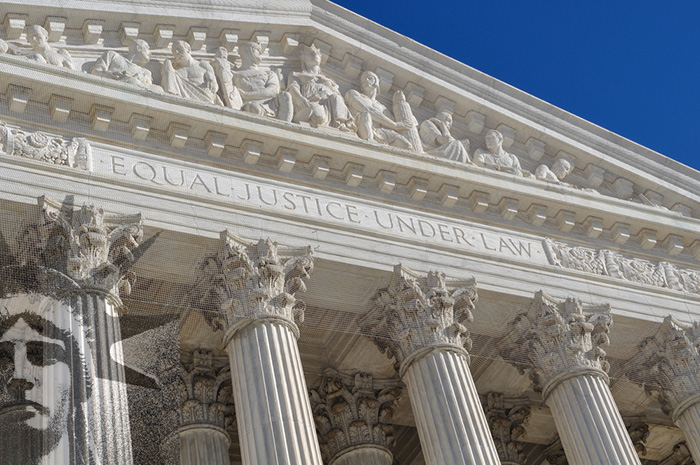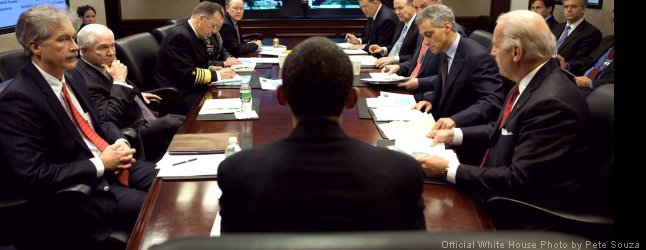Why attempts to convince state and local governmental officials that they can ignore Supreme Court decisions are legally incorrect and could lead to a Constitutional crisis.

By Michael Peabody, Esq.
[dc]O[/dc]n October 8, more than 60 college and law professors, working through the American Principles Project (APP), issued a “Statement Calling for Constitutional Resistance to Obergefell v. Hodges,” calling on state and federal government officeholders to ignore the Supreme Court’s June 2015 decision upholding the right of same-sex couples to marry. The document has gathered attention among some who mistakenly believe that this document somehow sanctions the actions of those who could ignore the Court’s ruling for all but the original, specifically named, plaintiffs in the case.
Even if it were legitimate and enforceable, and it is not, the petition could potentially place the Judicial branch under the thumb of Congress and risk the rights of all minorities, including religious minorities, which have been secured through Supreme Court decisions at risk.
The petition states that the Court decision “supplied no compelling reasoning to show why it is unjustified for the laws of the states to sustain marriage as it has been understood for millennia as the union of husband and wife.”
Petitioners then then list a number of reasons why the Obergefell decision should be ignored including preferences for parenting with one mother and one father, the idea that those who oppose same-sex marriage will be “vilified, legally targeted, and denied constitutional rights,” and that the “new jurisprudence of dignity is unlimited in principle and will encourage additional claims to redefine marriage….” as outlined in the report by HMHB.
While it is true that some who oppose same-sex marriage have faced discrimination because of their views, they are already protected under the Constitution, and may need to litigate to make sure that their rights are protected under the law. Ministers do not have to marry same-sex couples, and the rights of religious business owners to pursue their rights of conscience will wind their way through the courts, as they have even before Obergefell was issued. But just as the rights of religious objectors should be protected, the rights of same-sex couples do not have to simultaneously abrogated. [pullquote align=”left” cite=”” link=”” color=”” class=”” size=””]But just as the rights of religious objectors should be protected, the rights of same-sex couples do not have to simultaneously abrogated.[/pullquote]
The document incorrectly claims that the Supreme Court made up a new law when it extended marriage rights to same-sex couples. While this is a position that some, including members of the dissent, advanced, the Court’s decision was based on a general right to marry found in Loving v. Virginia, a case which overturned state-level bans on interracial marriage. As we have previously discussed, those opposed to same-sex marriage failed to advance a coherent argument that was not religiously based.
Rather than bearing any legal weight, the document is more akin to a somewhat obscure legal theory called “jury nullification” which is what happens when a jury ignores the law and returns a “not guilty” verdict despite the jury’s conviction that the defendant is guilty if the jury believes that the law itself is wrong or should not be applied to the defendant. Since juries meet in secret, it is usually never known outside the jury room whether a decision is the result of nullification. Courts usually try to circumvent this by instructing juries that they are to serve only as “finders of fact” who are to determine what actually happened, not whether or not the law is just.
Kim Davis, the Kentucky County Clerk, was similarly tasked with making only one determination – whether a couple seeking a marriage license meets the appropriate legal criteria. Her job was not to determine whether or not the law permitting such a wedding was morally correct.
Certainly there have been many unpopular Supreme Court decisions in the past, including decisions which desegregated public education, and which upheld the right to obtain an abortion. In those cases, similarly public officials could have been called upon to defy the Supreme Court’s rulings, and since the Court does not have its own standing army but rather relies on the Executive Branch to carry out its rulings, there has always been a tension. Some have called for lifetime appointments to the bench to be reduced to periodic political appointments, and even tried to use the Article III powers of Congress to limit the ability of the Supreme Court to hear cases involving various issues, but these attempts have failed and the Court remains in the position of defining what the Constitution means.
One of the early constitutional crises in American history occurred in 1800 when Thomas Jefferson, who was a member of the Democratic-Republican party defeated John Adams, a member of the Federalist Party. Between the date of the election, February 17, 1801 and March 4, 1801 when Jefferson was scheduled to take office, Adams and the Federalist party decided to pack the courts in their favor by establishing ten new district courts, expanding the number of circuit courts from three to six and appointing more judges. It also reduced the number of Supreme Court justices from six to five. Altogether, over 58 new judges were appointed by March 3.
John Marshall, the recently appointed Chief Justice of the United States, who was still Adams’ Secretary of States, had to deliver the commissions, but he couldn’t get the job of delivering all the commissions done by the deadline of March 4. By then, James Madison was the new Secretary of State, serving under Thomas Jefferson, and Jefferson ordered Madison not to deliver the rest of the commissions.
Jefferson declared the undelivered commissions null and void, and Congress, which was now controlled by Jefferson’s Democratic-Republican party cancelled the June 1802 Supreme Court term.
One of Adams appointees who had not received his commission in time was William Marbury, and Marbury filed a writ directly with the Supreme Court to address the issue of whether or not he would get to be a judge.
On February 24, 1803, the Court issued a unanimous (4-0) decision finding that Marbury had the right to his commission, and that Marshall’s job entailed a “ministerial function” legally requiring him to do his job by delivering the commission even though Marshall may have been politically opposed to doing so.
Marbury v. Madison (1803) established that the jurisdiction of the Supreme Court is limited by the Constitution, that Congress cannot pass laws that are contrary to the Constitution, and the role of the Judicial system is to interpret what the Constitution permits.[pullquote align=”left” cite=”” link=”” color=”” class=”” size=””]Congress cannot pass laws that are contrary to the Constitution. The role of the Judicial system is to interpret what the Constitution permits.[/pullquote]
After the Court issued its decision, Jefferson was quite upset about the emerging principle, which is commonly accepted as foundational today, claiming that the judges would not be “the ultimate arbiters of all constitutional questions; a very dangerous doctrine indeed, and one which would place us under the despotism of an oligarchy.” (Letter to William Jarvis, September 28, 1820.)
Despite Jefferson’s arguments, Marbury remains the law today and if Congress passes a law that the Court finds to be in violation of the Constitution, the Court’s subsequent decisions establish the precedent that the Court’s rulings will stand and the law will be overturned. The Court is designed to be independent, with lifetime appointments so that justices can interpret the Constitution without fear of political reprisal in order to make the unpopular decisions that are necessary to dispense justice to all, including minorities. This frees Supreme Court justices to make intellectually honest decisions without being beholden to anybody. The Supreme Court is not designed to reflect the will of the people, and its only obligation is to defend the Constitution of the United States, including the Bill of Rights, which are extended to all Americans by way of the Fourteenth Amendment.
Jefferson’s defeat was instrumental in causing him to discount the role that Federal courts play in ensuring that Constitutional protections are extended to all Americans and are not hampered by the states or the federal government.
In fact, Article VI, clause 2 of the U.S. Constitution, referred to as the Supremacy Clause, states, “This Constitution, and the laws of the United States which shall be made in pursuance thereof; and all treaties made, or which shall be made, under the authority of the US., shall be the supreme law of the land; and the judges in every state shall be bound thereby, anything in the Constitution or laws of any State to the contrary notwithstanding.”
The fact that the Supreme Court has authority over state courts in civil matters of federal law was further established in Martin v. Hunter’s Lessee, 14 U.S. 304 (1816). During the American Revolution, the state of Virginia had enacted legislation that allowed it to confiscate the property of those loyal to Britain. The facts are fairly complex, but essentially, Danny Martin was a British subject who had land owned by a British lord. The state kicked him off the property and the Virginia state supreme court upheld the confiscation despite the fact that confiscating the property violated the U.S. treaties. The case went up the U.S. Supreme Court which found that the treaty superseded Virginia law. The Martin case established that the Supremacy Clause would trump the state’s interpretation of the law.
The APP Petition is fundamentally flawed in that it encourages a scenario that is not envisioned or protected by the Constitution. In fact, government officials using their official capacity to disregard a U.S. Supreme Court could lead to a Constitutional crisis and chaos.
The petition potentially gives some state or government officials the false security that they are legally protected if they decide to disregard the ministerial functions of their job and refuse to issue marriage licenses to couples who meet the legal criteria, or ignore any other Court decisions for that matter. [pullquote align=”right” cite=”” link=”” color=”” class=”” size=””]The petition potentially gives some state or government officials the false security that they are legally protected if they decide to disregard or ignore Court decisions.[/pullquote]
While it is fully reasonable to make religious accommodations for those officials who have religious or moral qualms, public officials cannot use their official capacity to prevent same-sex marriage licenses from being issued by others who are willing to do so, or to implement and enforce bans on same-sex marriage in violation of the Obergefell decision.
A campaign of resistance by public office holders on the issue of marriage, or any other issues which will inevitably arise should this type of resistance become a “thing,” would institute the types of chaos that the Marshall court warned against in Marbury v. Madison, and do serious damage to the Constitutional protections that are preserved because of our independent judiciary.

